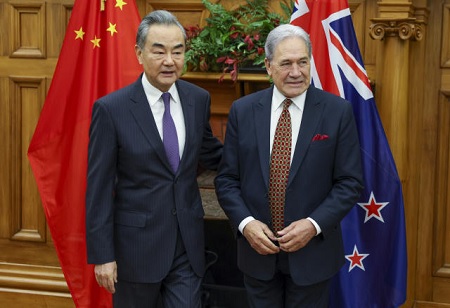
Chinese Foreign Minister Begins Diplomatic Tour, Meets New Zealand Counterpart

 During his tour of New Zealand and Australia, Chinese Foreign Minister Wang Yi engaged in discussions with his New Zealand counterpart. Winston Peters, the Deputy Prime Minister and Foreign Minister of New Zealand, welcomed Wang to Wellington, the capital city.
During his tour of New Zealand and Australia, Chinese Foreign Minister Wang Yi engaged in discussions with his New Zealand counterpart. Winston Peters, the Deputy Prime Minister and Foreign Minister of New Zealand, welcomed Wang to Wellington, the capital city.
“There have been some significant developments since we last met, not least a global pandemic that impacted both our countries", Peters said in his opening comments of their formal meeting at New Zealand's parliament house. “Today is a valuable opportunity to reflect on the challenges and opportunities that are now before us”.
Since his last visit in 2017, Wang is the most senior Chinese politician to make a trip to the country. New Zealand has maintained robust economic connections with China, notably being the inaugural developed nation to ink a bilateral free trade agreement with Beijing in 2008. During his stay in Wellington, Wang will hold brief discussions with Prime Minister Christopher Luxon and Trade Minister Todd McClay.
“China looks forward to working with the two countries to deliver on the common understandings between the leaders, enhance strategic communication, deepen mutual trust, advance exchanges and co-operation, promote the steady and sustained growth of the China-New Zealand and China-Australia comprehensive strategic partnerships and contribute to world peace, stability and prosperity”, foreign ministry spokesman Wang Wenbin said.
Wang is scheduled to land in Canberra, Australia, where he will convene with his counterpart Penny Wong. Their discussions are anticipated to focus on the situation involving the detained Australian, Yang Hengjun. This meeting marks the first face-to-face encounter between the two foreign ministers since Yang's espionage conviction and subsequent sentencing to death with a two-year reprieve after a closed trial in February.
Additionally, the agenda will address the elimination of the remaining trade tariffs imposed by China in 2020. These tariffs were largely seen as reprisals for actions taken by the previous Australian government, including passing laws prohibiting covert foreign interference in domestic politics, banning Chinese-owned telecommunications company Huawei from involvement in Australia's 5G network over security apprehensions, and advocating for an independent investigation into the COVID-19 pandemic. These tariffs, estimated to have cost the local economy around 20 billion Australian dollars ($13 billion), have been mostly lifted on various goods, except for wine, rock lobsters, and certain abattoirs.

